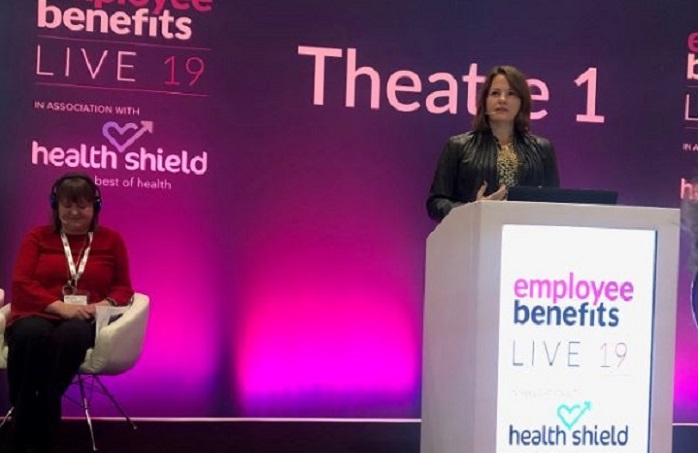
Employee Benefits Live 2019: Financial institution Royal Bank of Scotland (RBS) and software business SAP UK and Ireland shared insights surrounding their respective wellbeing strategies at Employee Benefits Live 2019.
In a session titled ‘Fostering a culture to support health and become and employer of choice’, delivered on Wednesday 2 October as part of the employee wellness conference stream, Fiona McAslan, global wellbeing lead at RBS, and Meghan McCarthy, head of HR at SAP UK and Ireland, shared key elements of their organisations’ wellbeing strategies and presented key takeaways that attendees could take back to their own businesses.
At RBS, which has 65,000 staff globally, wellbeing became a focus four years ago, alongside the introduction of a new chief executive officer, who wished to place people at the forefront of the business’ agenda. This included changing the organisation’s stance on wellbeing to be proactive rather than reactive, learning from initiatives such as the annual Britain’s healthiest workplace survey and taking into account the 2017 Stevenson-Farmer review, which centred on mental health.
Initially, the organisation’s wellbeing programme focused purely on physical health, with many of its components delivered in silos. RBS soon realised that a holistic approach would be much more beneficial, as each element of wellbeing impacts on the others. The new approach, called ‘Live well being you’, has a four pillar structure, incorporating physical, mental, social and financial wellbeing.
McAslan said: “We see wellbeing as the battery for the organisation. [If] wellbeing is really embedded in all of those areas, then it’s a really strong foundation, and that’s where [we are] now. We’ve got a really strong foundation of wellbeing, people understand our programme, they really get involved and we’re now looking to take it to the next level.”
Measures that RBS has introduced under its wellbeing banner include a global wellness challenge, with 51,000 employees getting involved, a wellbeing group on the organisation’s workplace Facebook site, which currently has 28,000 members, and signing the Time to Change employer pledge, committing to support mental health at work. RBS has also improved the usage of its employee assistance programme (EAP), from 6% to 18%, making it a proactive service rather than a crisis-point product.
Financial wellbeing is next on the agenda; RBS is currently organising a programme to encourage staff to save more into their pensions, and is considering implementing a debt consolidation benefit next year.
This positive focus on wellbeing has impacted on RBS’ engagement scores, as 62% of employees had a positive response to wellbeing questions within the organisation’s biannual survey in 2014, compared to 81% in 2019.
SAP’s McCarthy noted that employers are increasingly realising the importance of staff wellbeing. “[Businesses] are now seeing that they have a responsibility to their employees, not just for pay and for compensation and for insurance benefits, but for emotional wellbeing as well,” she said. “[Organisations] are starting to look at the importance of being authentic at work, and what that does to employee wellbeing.”
With this in mind, the organisation has implemented a mix of programmes, including a two-day mindfulness course, which has had 10,000 participants to date in 2019. SAP UK and Ireland also provides a Fit@SAP app, enabling staff to participate in and start various fitness and activity-related competitions. McCarthy herself participated in a challenge to virtually walk to Dublin, for example. The app currently has 10,000 active users.
The technology business also promotes global ambassadors for mental health and wellbeing to help bring its programme together and advertise it to all staff. It also provides for leaders, emphasising the impact that employee wellbeing can have on financial performance, as well as teaching managers how to put employees first; the training also ensures that leaders themselves are fit, healthy and well. SAP UK and Ireland additionally hosts events around wellbeing, for example, on the menopause and men’s health awareness.
Ten success of all of these initiatives is measured using nine questions pertaining to culture in SAP UK and Ireland’s annual staff survey. The organisation also looks at engagement and leadership trust scores, which have both improved.
McCarthy concluded: “We look at the health of our employees, we look at the health of our leadership and we hope it leads to the health of our business.”